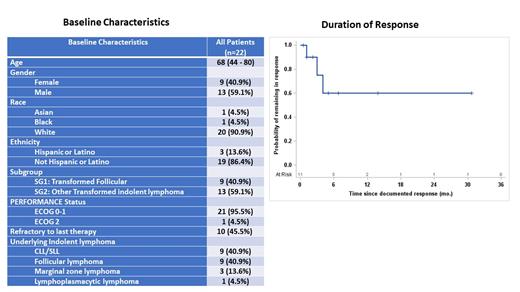Abstract
Introduction: Diffuse large B-cell lymphomas (DLBCL) transformed from indolent B-cell non-Hodgkin lymphomas (B-NHL) or Richter transformation (RT) from chronic lymphocytic leukemia/small lymphocytic lymphoma (CLL) are associated with a poor prognosis, particularly in patients (pts) with relapsed/refractory (RR) disease. PD-1/PD-L1 blockade has produced anti-tumor responses in pts with lymphoma; however, the response rate in pts with DLBCL is low. Preclinical data suggest that some "immunogenic" chemotherapies alter the tumor microenvironment and act synergistically with checkpoint blockade to improve anti-tumor responses. We evaluated the addition of the PD-L1 inhibitor, atezolizumab, to immunogenic chemoimmunotherapy, rituximab with gemcitabine and oxaliplatin (R-GEMOX) in pts with RR transformed DLBCL.
Methods:
Pts with DLBCL transformed from indolent B-NHL or RT from CLL that had received ≥ 1 prior regimen with ECOG performance status ≤ 2, and adequate organ and hematologic function were eligible for this phase 1 study. Two cohorts were enrolled, one for pts with DLBCL transformed from follicular lymphoma (FL) and another for pts with non-FL transformed DLBCL, including RT. R-GEMOX was administered without atezolizumab on C1D1, R-GEMOX+Atezo was given subsequently (Days 1+15 of 28 day cycles) for a maximum of 6 doses. Pts in CR could proceed to R+atezo q3w maintenance for up to 2 years. Pts could proceed to hematopoietic cell transplantation (HCT) without subsequent maintenance at the discretion of the treating MD. A safety lead-in (6 pts, any cohort) with dose-limiting toxicity (DLT) evaluation (28-day period, after 1 st dose of atezo) at dose level (DL) 1 (rituximab 375mg/m2, gemcitabine 1000mg/m2, oxaliplatin 100mg/m2, atezolizumab 840mg, with de-escalation dose level available) was enrolled to confirm the recommended phase 2 dose (RP2D). After confirmation of the RP2D, expansion will continue until enrollment of n=14 transformed FL and n=10 non-FL transformed DLBCL. Responses were assessed by investigators by PET-CT (after C2, C4, and then q12weeks) according to the 2014 Lugano Classification. The primary endpoint was safety and determination of the RP2D.
Results: 23 pts were enrolled, 22 were evaluable for response and adverse events (AEs), 1 is too early. Baseline characteristics are summarized in Table 1.
1/6 pts had a DLT related to atezolizumab during safety lead-in: grade (G) 4 Stevens-Johnson syndrome leading to death. DL1 was the RP2D. 2 pts were replaced during safety lead-in due to progressive disease (PD) prior to completing DLT evaluation. The most common AEs with R-GEMOX+Atezo (n=22) were fatigue (50%), elevated transaminases (45%), thrombocytopenia (45%), nausea/vomiting (41%), diarrhea (32%), fever (32%), hypertension (HTN) (27%), and neutropenia (27%). Common G3-4 AEs included lymphopenia (n=4), neutropenia (n=4), HTN (n=3), leukopenia (n=3), thrombocytopenia (n=3). Among 7 pts who proceeded to maintenance R-atezo, the most common AEs were fatigue (n=4) and HTN (n=3). There were 2 deaths related to study therapy, the pt with SJS and 1 pt with infusion reaction leading to respiratory failure who also had PD with both factors likely contributing to death. In addition, 1 pt had both sepsis and PD and died during maintenance, considered possibly related to treatment. 7 deaths were unrelated to treatment, including 1 from complications after autologous HCT, and 6 after PD.
5 pts remain on treatment; 17 pts are off treatment. Reasons for study discontinuation include: insufficient response/PD (n=12), HCT (n=2), death due to toxicity (n=2), and G3 neuropathy during maintenance (n=1).
Among the 22 pts, the ORR was 50% and CR rate was 29%. The 9 pts with transformed FL had an ORR of 67% and CR rate of 33%. The 13 pts with non-FL transformed DLBCL/RT had an ORR of 38% and CR rate of 23%. Of 9 pts with RT there was 1 CR and 1 PR while all 3 pts with transformed marginal zone lymphoma responded (2 CR, 1 PR). Among responders (n=11), the median duration of response was not reached (Figure 1). Of the 6 pts with CR, 2 proceeded to HCT, and 4 had ongoing CR lasting 30.7+ months (mo), 13.9+ mo, 6.8+ mo, 5.0+ mo. Of the 5 patients with PR, 1 pt died of SJS without PD, PR lasted 3 and 4 mo in 2 patients (PD), and 2 pts have ongoing response (0.5+ and 2.0+ mo).
Conclusions: R-GemOx+Atezo was tolerable and produced objective responses in patients with transformed DLBCL/RT, with all pts in CR having ongoing response.
Herrera: Gilead Sciences: Research Funding; ADC Therapeutics: Consultancy, Research Funding; Genentech: Consultancy, Research Funding; Tubulis: Consultancy; Takeda: Consultancy; Merck: Consultancy, Research Funding; Bristol Myers Squibb: Consultancy, Research Funding; Kite, a Gilead Company: Research Funding; AstraZeneca: Consultancy, Research Funding; Karyopharm: Consultancy; Seagen: Consultancy, Research Funding. Allen: Epizyme: Consultancy; Kyowa Kirin: Consultancy; Secure Bio: Consultancy; ADC Therapeutics: Consultancy; MorphoSys: Consultancy. Popplewell: Hoffman La Roche: Other: Food; Novartis: Other: Travel; Pfizer: Other: Travel. Shouse: Beigene: Honoraria; Kite Pharma: Speakers Bureau. Siddiqi: AstraZeneca: Membership on an entity's Board of Directors or advisory committees, Speakers Bureau; Pharmacyclics LLC, an AbbVie Company: Membership on an entity's Board of Directors or advisory committees, Research Funding, Speakers Bureau; Oncternal: Research Funding; BeiGene: Membership on an entity's Board of Directors or advisory committees, Research Funding, Speakers Bureau; Juno Therapeutics: Membership on an entity's Board of Directors or advisory committees, Research Funding; BMS: Membership on an entity's Board of Directors or advisory committees, Research Funding, Speakers Bureau; Kite Pharma: Membership on an entity's Board of Directors or advisory committees, Research Funding; Celgene: Membership on an entity's Board of Directors or advisory committees; Janssen: Speakers Bureau; TG Therapeutics: Research Funding. Danilov: Gilead Sciences: Research Funding; Pharmacyclics: Consultancy, Honoraria; Beigene: Consultancy, Honoraria; Abbvie: Consultancy, Honoraria; TG Therapeutics: Consultancy, Research Funding; Takeda Oncology: Research Funding; Genentech: Consultancy, Honoraria, Research Funding; SecuraBio: Research Funding; Bayer Oncology: Consultancy, Honoraria, Research Funding; Astra Zeneca: Consultancy, Honoraria, Research Funding; Bristol-Meyers-Squibb: Honoraria, Research Funding; Rigel Pharm: Honoraria. Tuscano: Seattle Genetics: Research Funding; Bristol Myers Squibb: Research Funding; Takeda: Research Funding; Acrotech: Research Funding; Genentech: Research Funding; Pharmacyclics: Research Funding; Abbvie: Research Funding.
Atezolizumab is not approved for the treatment of aggressive B-cell non-Hodgkin lymphoma


